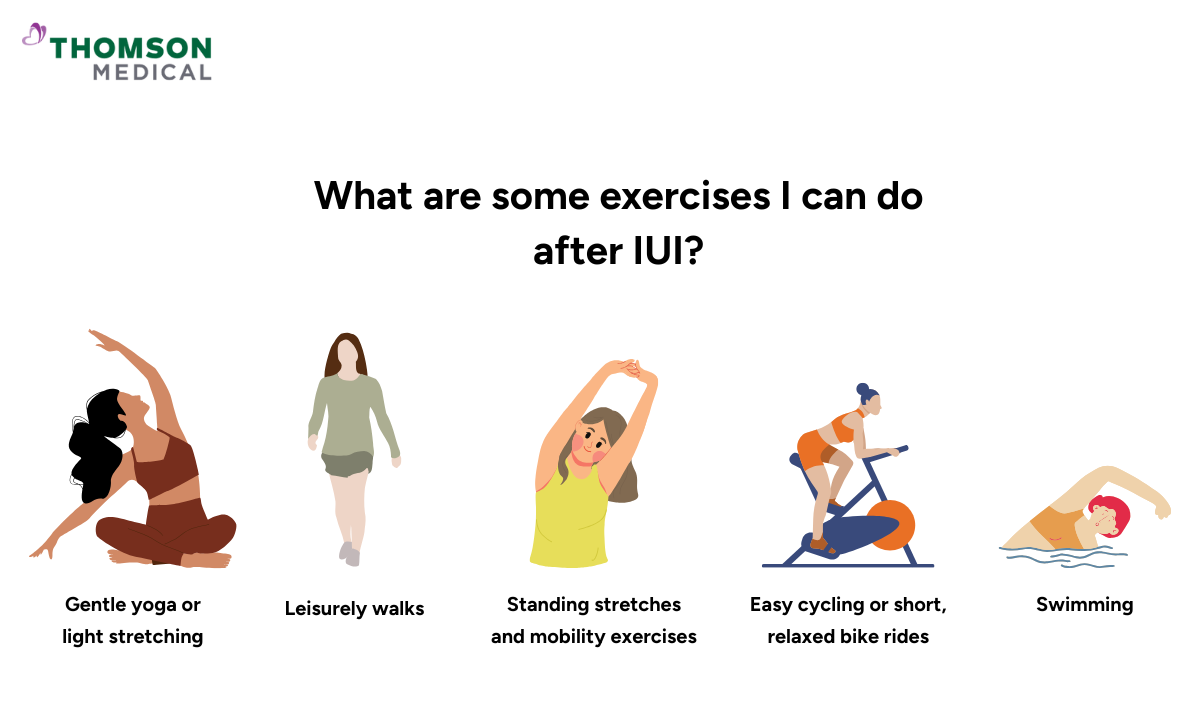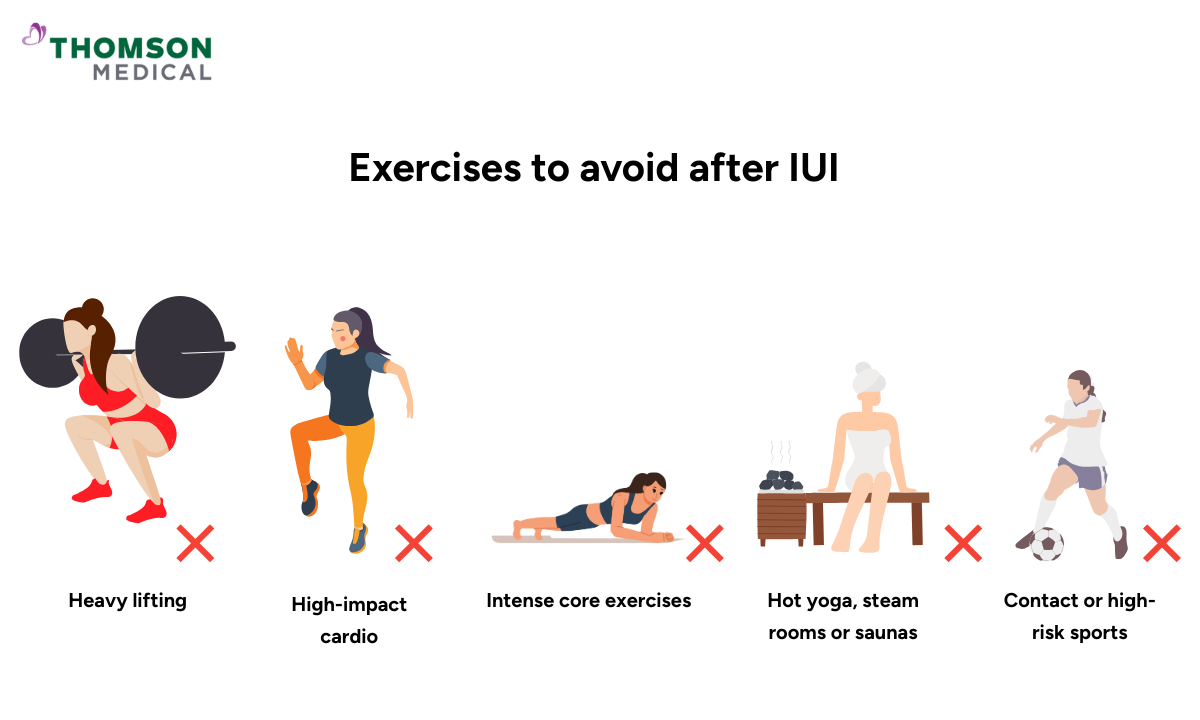Exercise can be an important part of maintaining overall health, even when you’re undergoing fertility treatments like intrauterine insemination (IUI). Staying active can support your overall well-being, but knowing which movements are gentle and safe is key.
In this guide, we’ll walk you through simple tips and safe exercises after IUI so you can feel confident caring for your body during this important time.
Can I exercise after getting an IUI?
Yes, but keep it gentle. Light to moderate exercise is usually safe after an IUI procedure, particularly if you were already active beforehand. Gentle movement can even help reduce stress and improve blood flow. However, it’s best to avoid intense workouts, heavy lifting, or high-impact activities for a few days to give your body time to rest and support the implantation process.
What are some exercises I can do after IUI?

After an IUI procedure, focus on safe, low-impact activities that keep your body moving without adding stress. Some good options include:
Gentle yoga or light stretching
Leisurely walks
Standing stretches and mobility exercises
Easy cycling or short, relaxed bike rides
Swimming (after 24–48 hours if you’re not experiencing spotting)
Remember, these movements can improve circulation, ease stress, and help you feel more comfortable — all while supporting your body’s recovery and potential implantation.
Risks of exercising after IUI
Yes, while light movement is usually safe, vigorous or high-impact workouts can sometimes pose risks in the days following IUI. Intense exercise may:
Trigger stronger uterine contractions, which could affect implantation (though research is still limited)
Cause overheating or raise stress hormone levels like cortisol
Reduce blood flow to the uterus if your body becomes fatigued or overexerted
Therefore, doctors often recommend taking it easy for the first 2–5 days after the procedure before gradually returning to your normal routine.
Everyone’s body reacts differently. If you’re unsure about exercise, spotting or symptoms, speak with our fertility specialists for personalised guidance. Request an appointment with Thomson Medical, and we will help to support your recovery and implantation journey.
IUI specialists
Loading...
Are there exercises you should avoid after IUI?

If you’re recovering from IUI, it’s important to avoid strenuous exercise during the two-week wait. Activities that can increase strain or body temperature may interfere with implantation, such as:
Heavy lifting (over 10–15 lbs)
High-impact cardio like running, jumping or HIIT workouts
Intense core exercises such as planks, crunches or twists
Hot yoga, steam rooms or saunas, which may cause overheating
Contact or high-risk sports that increase the chance of injury
General guideline: If a workout makes you sweat excessively, feel strained, or leave you exhausted, it’s best to postpone it until after your pregnancy test.
How else can I support my health after IUI?
After IUI, your body requires more than just rest. Simple lifestyle habits can help create the best environment for implantation and early pregnancy:
Eat a balanced, fertility-friendly diet rich in protein, leafy greens, whole grains, and omega-3 fatty acids.
Stay hydrated with 2–3 litres of water daily.
Get quality sleep — aim for 7–9 hours each night.
Manage stress through meditation, breathing exercises, or therapy.
Avoid alcohol and smoking, and limit caffeine to support hormone balance.
Follow your doctor’s advice on progesterone, supplements, or prescribed medications.
These small, consistent choices can help you feel stronger, calmer, and more prepared during the two-week wait.
FAQ
Does exercise affect implantation after IUI?
Light exercise is safe, but strenuous workouts may disrupt hormones, increase uterine contractions, or reduce blood flow — potentially affecting implantation. To support implantation, choose gentle, moderate exercise and avoid high-intensity workouts during the early post-IUI phase.
How many days should I rest after IUI?
Rest on the day of the procedure (and possibly the next). You can ease back into light activity after a day or two, but try to skip intense workouts during the two‑week wait to give your body the best chance to focus on implantation.
When can I start exercising after IUI?
You can usually do light movement — like walking or gentle stretching — within 24–48 hours. During the two‑week wait, stick to easy, low‑impact activities. If your pregnancy test is negative, you can return to your normal workout routine once your doctor gives the go‑ahead.
Can too much exercise prevent implantation?
Possibly. Very intense workouts can raise stress hormones, trigger uterine contractions, and reduce blood flow to the uterus, which may affect implantation. But don’t worry as normal daily activity and gentle movement are completely safe during this time.
Can I go walking after IUI?
Absolutely! Walking is one of the safest and most beneficial activities after IUI. It boosts blood flow, reduces stress, and is easy on your body. Just keep the pace gentle, especially during the first few days.
Can we do belly exercise while trying to conceive?
Gentle core exercises are generally safe while trying to conceive, but avoid overly intense or high‑impact moves (like heavy crunches or twisting routines) if you’re actively undergoing fertility treatments such as IUI or IVF. Opt for low‑impact strengthening like pelvic tilts or light yoga, and check with your doctor if you’re unsure.
If you're considering IUI as a fertility treatment option, request a consultation with our fertility specialists at the Thomson Fertility Centre for personalised recommendations and tailored advice.
The information provided is intended for general guidance only and should not be considered medical advice. For personalised recommendations and tailored advice, please consult a specialist at Thomson Medical. Request an appointment with Thomson Medical today.
For more information, contact us:
Thomson Fertility
- Paragon: 6252 7766
Thomson Specialists (Women's Health)
Request an Appointment